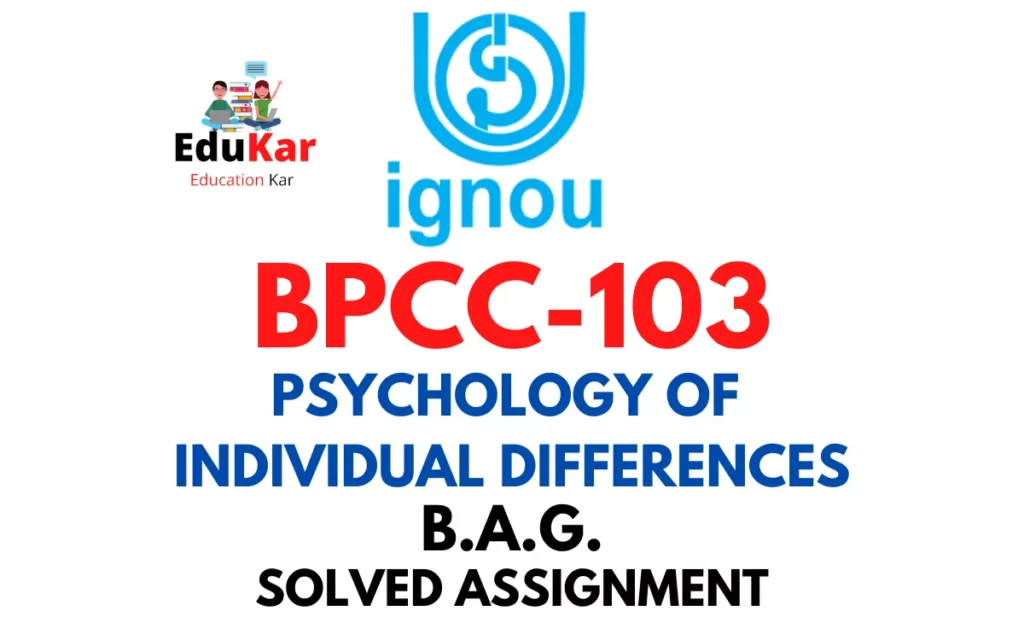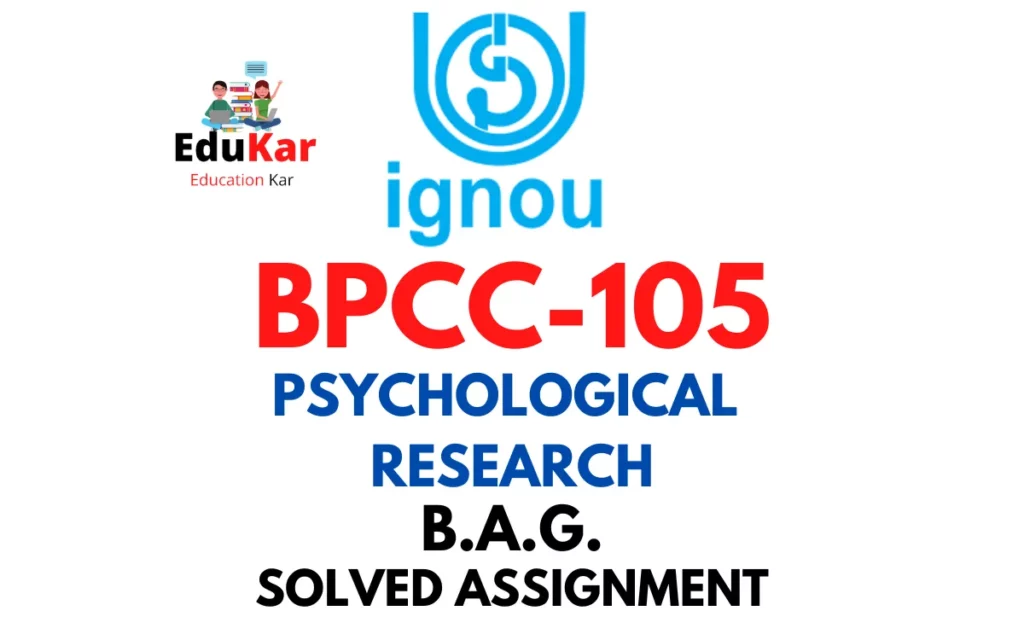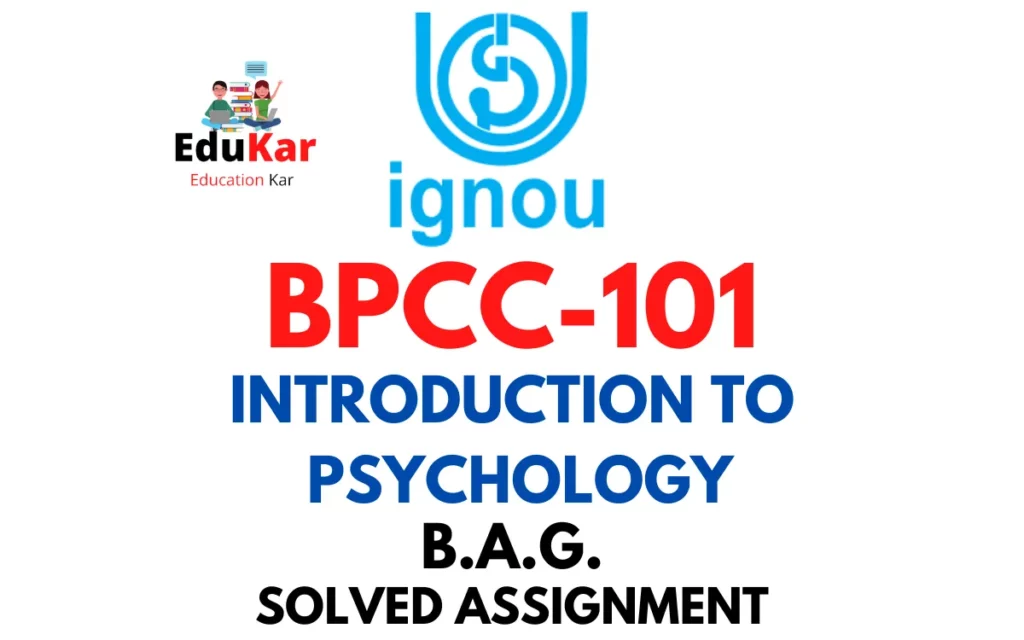Contents
- 1 Assignment 1
- 2 Answer the following descriptive category questions in about 500 words each.
- 3 Assignment 2
- 4 Answer the following short category questions in about 100 words each.
- 4.1 4. Describe the functions of emotions.
- 4.2 5. Describe the five components of emotions.
- 4.3 6. Describe the historical development of emotional intelligence.
- 4.4 7. Write down the benefits of emotional intelligence.
- 4.5 8. What is self-regulation? Describe the sub-components of it.
- 4.6 9. Describe the meaning and importance of self control.
- 4.7 10. Describe the strategies to develop assertiveness.
- 4.8 11. Explain Maslow’s hierarchy of needs.
- 5 FAQs
Welcome to the solution guide for BPCS 183-(IGNOU-BAG) Solved Assignment. This comprehensive resource provides in-depth answers to all the questions included in the course material, ensuring that you have a solid understanding of the subject matter.
| Title | BPCS-183 EMOTIONAL INTELLIGENCE (BAG) Solved Assignment 2022-2023 |
| University | IGNOU |
| Degree | Bachelor Degree Programme |
| Course Code | BPCS-183 |
| Course Name | EMOTIONAL INTELLIGENCE |
| Year | 2023 |
| Language | English |
| Assignment Code | Asst /TMA /2022-23 |
| Last Date for Submission of Assignment: | For June Examination: 31st March For December Examination: 30th September |
Assignment 1
Answer the following descriptive category questions in about 500 words each.
1. Differentiate between emotions, feelings and mood.
Ans: Emotions, feelings, and moods are related yet distinct psychological experiences that are often used interchangeably but have distinct characteristics.
Emotions are brief and intense psychological experiences that are triggered by a specific event or stimulus and involve specific physiological and behavioral changes. Emotions are typically experienced as a response to a particular event or situation, and they have an underlying adaptive function, such as fear preparing the individual to respond to a threat, or joy reinforcing positive social interactions. Some common emotions include anger, joy, fear, surprise, disgust, and sadness.
Feelings, on the other hand, are the conscious experience of emotions. Feelings are the subjective experience of emotions and can be described in terms of their intensity, duration, and character. While emotions are triggered by specific events, feelings can be more enduring and less tied to a specific trigger. For example, a person may feel a sense of sadness even if there is no specific event that is causing the emotion.
Moods, on the other hand, are less intense and less specific than emotions and feelings, and they tend to be more diffuse and long-lasting. Moods are often described as a general and ongoing emotional state or atmosphere that pervades a person’s experience. Moods can be influenced by a wide range of factors, including physical health, life events, and psychological factors, and they can have a significant impact on a person’s behavior and interactions with others. Some common moods include elation, dejection, contentment, and irritability.
2. Define emotional intelligence in terms of what it is and what it is not.
Ans: Emotional intelligence (EI) refers to the ability to understand and manage one’s own emotions, as well as the emotions of others. It involves the capacity to recognize emotions in oneself and others, to use this information to guide thought and behavior, and to regulate emotions in a healthy manner. Emotional intelligence has been recognized as an important factor in personal and professional success, as it enables individuals to navigate complex social situations effectively and build positive relationships.
Emotional intelligence is not to be confused with IQ, which measures cognitive abilities such as memory and problem-solving. Unlike IQ, EI is a flexible and adaptable skill that can be developed over time through practice and experience. It is also not limited to specific personality traits, such as being extroverted or introverted. Rather, emotional intelligence is a combination of skills and abilities that are present in varying degrees in all individuals.
There are several key components of emotional intelligence. Self-awareness involves the ability to recognize one’s own emotions and to understand how they impact thought and behavior. This requires a high level of introspection and self-reflection. Self-regulation refers to the ability to manage one’s own emotions, so that they do not interfere with decision making or effective communication. Empathy involves the capacity to understand the emotions of others and to respond in a supportive and appropriate manner. Social skills involve the ability to use emotional intelligence to build strong relationships, communicate effectively, and resolve conflicts.
In the workplace, emotional intelligence can have a significant impact on career success. Individuals with high EI tend to be more effective leaders and better communicators, as they are able to build strong relationships and understand the emotional needs of others. They are also better able to manage stress, as they have a greater understanding of their own emotions and how to regulate them. Emotional intelligence is also important in personal relationships, as it enables individuals to understand and manage the emotions of their partners, friends, and family members, leading to stronger and more fulfilling relationships.
3. Explain the GENOS model of emotional intelligence.
Ans: The GENOS model of emotional intelligence is a comprehensive framework that outlines the key components of emotional intelligence and provides a roadmap for developing this important skill. The model was developed by the Institute of Emotional Intelligence and provides a practical approach to understanding and improving emotional intelligence.
The GENOS model consists of five core components of emotional intelligence: self-awareness, self-regulation, motivation, empathy, and social skills.
Self-awareness refers to the ability to understand one’s own emotions and how they impact thoughts and behavior. This component involves recognizing and understanding one’s emotions, values, beliefs, and motivations. It also includes the ability to accurately assess one’s strengths and weaknesses and to recognize how these impact one’s relationships and interactions with others.
Self-regulation involves managing one’s own emotions in a healthy and effective manner. This component involves the ability to control impulsive behaviors and to manage stress and emotions in a constructive way. It also involves the ability to set and maintain healthy boundaries and to make decisions based on values and goals, rather than being driven by emotions.
Motivation refers to the drive to achieve personal and professional goals, and involves the ability to stay focused and committed to these goals, even in the face of challenges and obstacles. This component involves the ability to stay positive and optimistic, even in the face of setbacks and failures.
Empathy involves the ability to understand the emotions of others and to respond in a supportive and appropriate manner. This component involves the ability to listen actively, to understand the perspectives of others, and to respond in a way that promotes understanding and connection. It also involves the ability to manage conflicts effectively and to find common ground with others.
Social skills involve the ability to build strong relationships and to communicate effectively. This component involves the ability to build rapport and trust, to negotiate and resolve conflicts, and to lead and influence others. It also involves the ability to build strong, supportive networks and to collaborate effectively with others.
The GENOS model of emotional intelligence provides a practical framework for developing emotional intelligence and for improving personal and professional relationships. By focusing on the five core components of emotional intelligence, individuals can build their awareness, understanding, and ability to manage their own emotions and the emotions of others. This can lead to improved relationships, increased career success, and greater overall well-being.
Assignment 2
Answer the following short category questions in about 100 words each.
4. Describe the functions of emotions.
Ans: Emotions serve important adaptive functions in humans and animals, serving as signals to coordinate behavior, promote social interaction, and motivate action. Emotions also provide information about the significance of events and help to prioritize responses, with strong emotions often indicating high levels of urgency. Emotions also influence thought processes, guiding attention and memory, and can shape beliefs and attitudes. Moreover, emotions can contribute to physical and mental well-being by regulating physiological responses and facilitating stress management. Overall, emotions are essential for navigating the complex and dynamic social and physical environments in which humans and animals exist.
5. Describe the five components of emotions.
Ans: The five components of emotions are physiological arousal, expression, cognition, motivation, and subjective experience.
- Physiological arousal refers to the physical responses to emotions, such as increased heart rate, sweating, or changes in breathing.
- Expression refers to the way emotions are shown through facial expressions, body language, or vocal cues.
- Cognition refers to the thoughts and beliefs that accompany emotions, such as perception of a situation or interpretation of an event.
- Motivation refers to the drive or urge that emotions can create, such as the desire to approach or avoid a situation or person.
- Subjective experience refers to the personal experience of emotions, including the awareness of feeling and the intensity of the emotion.
Together, these five components make up the full experience of emotions, and understanding each component can help individuals better understand and manage their emotions.
6. Describe the historical development of emotional intelligence.
Ans: Emotional intelligence (EI) as a concept has its roots in early 20th century theories of intelligence and emotions. However, it wasn’t until the 1990s that EI gained widespread attention with the publication of psychologist Daniel Goleman’s book “Emotional Intelligence: Why It Can Matter More Than IQ.” The concept of EI has since evolved and been integrated into various fields including psychology, education, and business. Today, EI is widely recognized as a key aspect of individual and group success, with ongoing research examining its dimensions, assessment, and applications in various settings. EI has also been linked to a range of positive outcomes such as better relationships, higher job performance, and improved mental health.
7. Write down the benefits of emotional intelligence.
Ans: Emotional intelligence has numerous benefits for individuals and organizations. Some of the key benefits include:
- Improved relationships: Emotional intelligence helps individuals build stronger relationships with others by improving communication, empathy, and conflict resolution skills.
- Increased self-awareness: Understanding one’s own emotions and how they impact thoughts and behaviors leads to greater self-awareness and personal growth.
- Better stress management: Emotional intelligence helps individuals better manage stress and emotions, leading to increased well-being and resilience.
- Enhanced decision making: Emotional intelligence improves decision making by allowing individuals to consider the emotional impact of their decisions.
- Improved performance: Emotional intelligence is positively correlated with job performance, leading to increased productivity and success in the workplace.
- Better leadership: Emotional intelligence helps individuals become more effective leaders by improving communication and collaboration skills, and by creating a more positive and productive work environment.
8. What is self-regulation? Describe the sub-components of it.
Ans: Self-regulation is the process by which individuals control their thoughts, emotions, and behaviors to reach their goals and maintain personal standards. It is a key aspect of emotional intelligence and overall well-being. The sub-components of self-regulation include:
- Emotional regulation: The ability to manage and express emotions in an appropriate way.
- Impulse control: The ability to resist acting on urges or temptations that may interfere with goals.
- Cognitive regulation: The ability to direct and control attention and thoughts, especially in challenging situations.
- Motivation regulation: The ability to set and pursue goals, maintain persistence and effort, and manage disappointment and frustration.
- Behavioral regulation: The ability to control actions, both in response to internal and external stimuli.
9. Describe the meaning and importance of self control.
Ans: Self control is the ability to regulate one’s thoughts, emotions, and actions in order to achieve one’s goals and maintain a sense of balance and inner harmony. It is an important aspect of personal development and well-being, as it allows individuals to make conscious and deliberate choices, rather than acting impulsively or being swayed by external circumstances. A strong sense of self control can help individuals resist negative impulses, manage stress and emotions, improve relationships, and achieve their goals. It is an important skill to develop and cultivate in order to lead a fulfilling and successful life.
10. Describe the strategies to develop assertiveness.
Ans: Assertiveness is the ability to express oneself in a confident and direct manner while respecting others. Here are some strategies to develop assertiveness:
- Know your rights and communicate them clearly.
- Practice active listening and avoid interrupting others.
- Learn to say “no” without feeling guilty or ashamed.
- Stand up for yourself and speak your truth.
- Maintain eye contact and an open body posture.
- Acknowledge and validate others’ feelings.
- Use “I” statements instead of blaming others.
- Focus on finding mutually beneficial solutions.
- Seek out assertiveness training or therapy if needed.
- Practice, practice, practice in everyday situations. By consistently using assertiveness skills, you can become more confident and self-assured in expressing your thoughts and needs.
11. Explain Maslow’s hierarchy of needs.
Ans: Maslow’s hierarchy of needs is a theory in psychology that outlines a five-tier model of human needs, organized in a hierarchical manner. The five needs, in order of priority, are physiological needs (such as food, water, and shelter), safety needs, love and belonging needs, esteem needs, and self-actualization needs (such as personal growth and fulfillment). The idea is that lower needs must be met before higher needs can be addressed. Once one level of needs is met, the individual moves on to the next level of needs, until they reach the highest level of self-actualization. This hierarchy provides a framework for understanding how individuals prioritize their needs and how they can motivate themselves and others towards growth and self-fulfillment.
FAQs
How to Download BPCS-183 EMOTIONAL INTELLIGENCE Solved Assignment?
You can download it from the www.edukar.in, they have a big database for all the IGNOU solved assignments.
Is the BPCS-183 EMOTIONAL INTELLIGENCE Solved Assignment Free?
Yes this is absolutely free to download the solved assignment from www.edukar.in
What is the last submission date for (IGNOU-BAG) Solved Assignment?
For June Examination: 31st March, For December Examination: 30th September

![[Solved Assignment] BPCS 185-DEVELOPING EMOTIONAL COMPETENCE (IGNOU-BAG) 2022-2023 [Solved Assignment] BPCS 185-DEVELOPING EMOTIONAL COMPETENCE (IGNOU-BAG) 2022-2023](https://edukar.in/wp-content/plugins/contextual-related-posts/default.png)



![[Solved Assignment] BPCS 188-APPLICATIONS OF SOCIAL PSYCHOLOGY (IGNOU-BAG) 2022-2023 BPCS 188-APPLICATIONS OF SOCIAL PSYCHOLOGY IGNOU BAG Solved Assignment 2022-2023](https://edukar.in/wp-content/uploads/2023/01/BPCS-188-APPLICATIONS-OF-SOCIAL-PSYCHOLOGY-IGNOU-BAG-Solved-Assignment-2022-2023-1024x640.webp)










